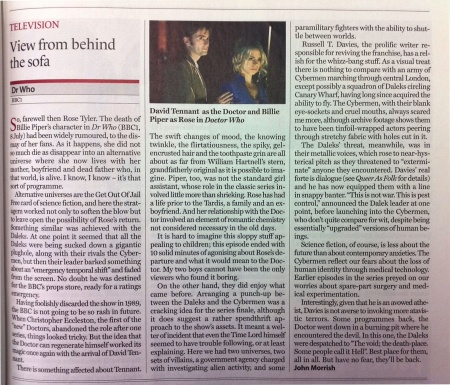View from behind the sofa
- Publication: The Tablet
- Date: 2006-07-15
- Author: John Morrish
- Page: 25
- Language: English
So, farewell then Rose Tyler. The death of Billie Piper's character in Dr Who (BBC1, 8 July) had been widely rumoured, to the dismay of her fans. As it happens, she did not so much die as disappear into an alternative universe where she now lives with her mother, boyfriend and dead father who, in that world, is alive. I know, I know - it's that sort of programme.
Alternative universes are the Get Out Of Jail Free card of science fiction, and here the stratagem worked not only to soften the blow but to leave open the possibility of Rose's return. Something similar was achieved with the Daleks. At one point it seemed that all the Daleks were being sucked down a gigantic plughole, along with their rivals the Cybermen, but then their leader barked something about an "emergency temporal shift" and faded from the screen. No doubt he was destined for the BBC's props store, ready for a ratings emergency.
Having foolishly discarded the show in 1989, the BBC is not going to be so rash in future. When Christopher Eccleston, the first of the new" Doctors, abandoned the role after one series, things looked tricky. But the idea that the Doctor can regenerate himself worked its magic once again with the arrival of David Tennant,
There is something affected about Tennant. David Tennant as the Doctor and Billie Piper as Rose in Doctor Who The swift changes of mood, the knowing twinkle, the flirtatiousness, the spiky, gel-encrusted hair and the toothpaste grin are all about as far from William Hartnell's stern, grandfatherly original as it is possible to imagine. Piper, too, was not the standard girl assistant, whose role in the classic series involved little more than shrieking. Rose has had a life prior to the Tardis, a family and an ex-boyfriend. And her relationship with the Doctor involved an element of romantic chemistry not considered necessary in the old days.
It is hard to imagine this sloppy stuff appealing to children; this episode ended with 10 solid minutes of agonising about Rose's departure and what it would mean to the Doctor. My two boys cannot have been the only viewers who found it boring.
On the other hand, they did enjoy what came before. Arranging a punch-up between the Daleks and the Cybermen was a cracking idea for the series finale, although it does suggest a rather spendthrift approach to the show's assets. It meant a welter of incident that even the Time Lord himself seemed to have trouble following, or at least explaining. Here we had two universes, two sets of villains, a government agency charged with investigating alien activity, and some paramilitary fighters with the ability to shuttle between worlds.
Russell T. Davies, the prolific writer responsible for reviving the franchise, has a relish for the whizz-bang stuff. As a visual treat there is nothing to compare with an army of Cybermen marching through central London, except possibly a squadron of Daleks circling Canary Wharf; having long since acquired the ability to fly. The Cybermen, with their blank eye-sockets and cruel mouths, always scared me more, although archive footage shows them to have been tinfoil-wrapped actors peering through stretchy fabric with holes cut in it.
The Daleks' threat, meanwhile, was in their metallic voices, which rose to near-hysterical pitch as they threatened to "exterminate" anyone they encountered. Davies' real forte is dialogue (see Queer As Folk for details) and he has now equipped them with a line in snappy banter. "This is not war. This is pest control," announced the Dalek leader at one point, before launching into the Cybermen, who don't quite compare for wit, despite being essentially "upgraded" versions of human beings.
Science fiction, of course, is less about the future than about contemporary anxieties. The Cybermen reflect our fears about the loss of human identity through medical technology. Earlier episodes in the series preyed on our worries about spare-part surgery and medical experimentation.
Interestingly, given that he is an avowed atheist, Davies is not averse to invoking more atavistic terrors. Some programmes back, the Doctor went down in a burning pit where he encountered the devil. In this one, the Daleks were despatched to "The void; the death-place. Some people call it Hell": Best place for them, all in all. But have no fear, they'll be back.
Disclaimer: These citations are created on-the-fly using primitive parsing techniques. You should double-check all citations. Send feedback to whovian@cuttingsarchive.org
- APA 6th ed.: Morrish, John (2006-07-15). View from behind the sofa. The Tablet p. 25.
- MLA 7th ed.: Morrish, John. "View from behind the sofa." The Tablet [add city] 2006-07-15, 25. Print.
- Chicago 15th ed.: Morrish, John. "View from behind the sofa." The Tablet, edition, sec., 2006-07-15
- Turabian: Morrish, John. "View from behind the sofa." The Tablet, 2006-07-15, section, 25 edition.
- Wikipedia (this article): <ref>{{cite news| title=View from behind the sofa | url=http://cuttingsarchive.org/index.php/View_from_behind_the_sofa | work=The Tablet | pages=25 | date=2006-07-15 | via=Doctor Who Cuttings Archive | accessdate=19 December 2025 }}</ref>
- Wikipedia (this page): <ref>{{cite web | title=View from behind the sofa | url=http://cuttingsarchive.org/index.php/View_from_behind_the_sofa | work=Doctor Who Cuttings Archive | accessdate=19 December 2025}}</ref>
